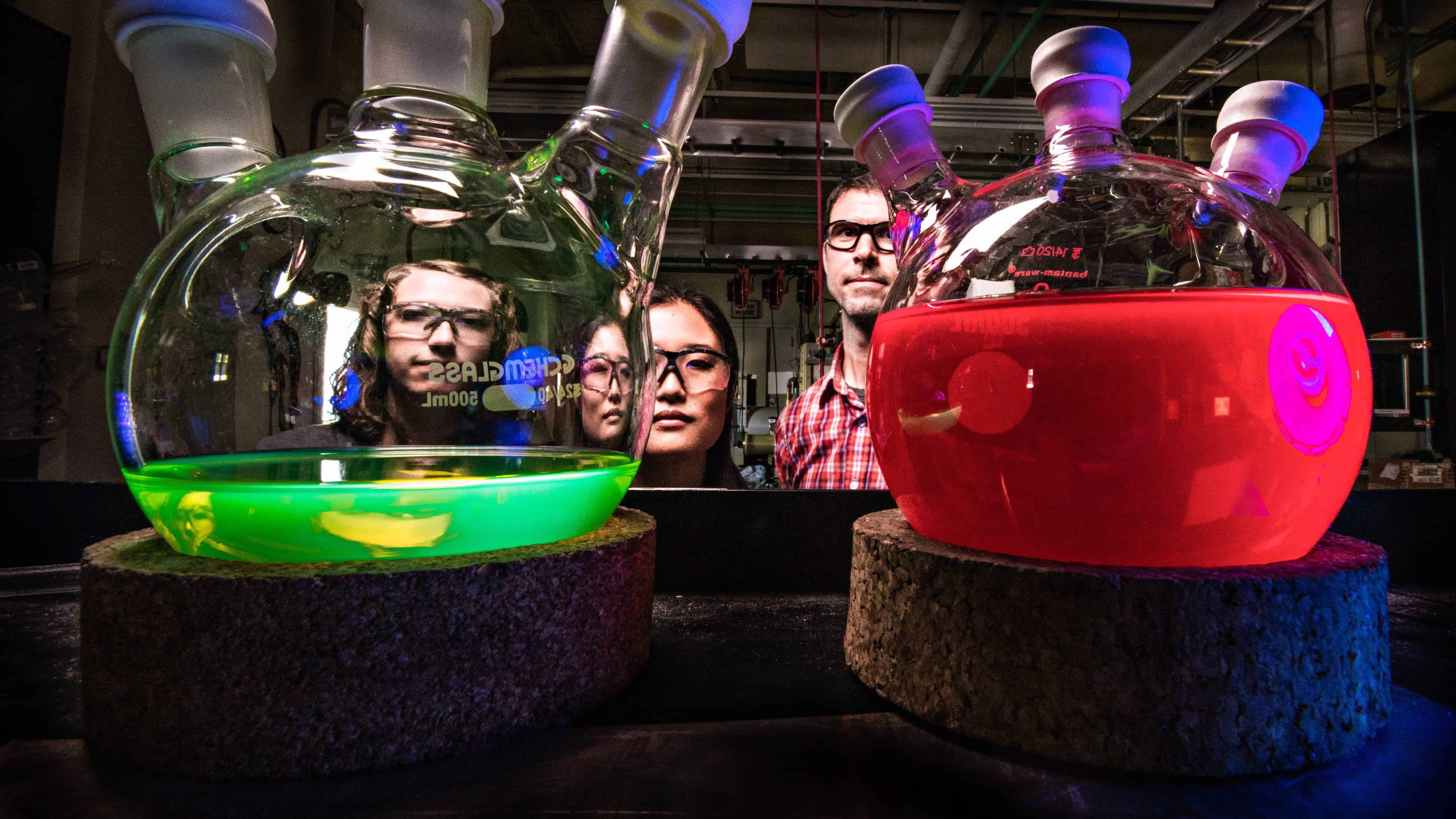Only 1 out of 7 drugs that enter clinical trials are ultimately approved. InterAx Biotech has developed a platform that combines information from experiments with a mathematical model of receptor signaling in cells. The goal of this platform is to find out which of the different molecules a pharma company is looking at is worth scrutinizing further, and which will turn out to be a dead end. This will speed up drug development, reducing cost and the need for animal trials. In this interview, InterAx CTO Aurélien Rizk explains why the EU Horizon 2020 program has contributed to an EUR 2.5 million project called PICARD to further develop the InterAx technology platform.

Co-founder and CTO, InterAx
Aurélien Rizk is co-founder and CTO of InterAx Biotech, a systems biology spin-off from ETH Zurich and PSI. Aurélien studied computer science at École Normale Supérieure de Rennes, has a Master in Bioinformatics and Biostatistics from University Paris XI and a Ph.D. in Computer Science applied to Systems Biology from INRIA Paris.
How did you become an entrepreneur?
My original plan, when I moved from France to Switzerland and spent 4 years as a Postdoc at the Paul Scherrer Institute was actually to pursue an academic career. But then I met Martin Ostermaier, who wanted to start his own company. I saw that as a nice opportunity to apply everything I had learned and developed so far, from computer science to systems biology, in a concrete drug discovery case.
Any regrets?
No. But when we started, we were confronted with a big challenge of how to measure the response of cells over time. When Maria Waldhoer, the CSO of InterAx, who had a lot of experience in assays and GPCR signaling, joined the startup, we had all the needed elements in place. With our systems biology platform, we’ve already tested 20 compounds for asthma in our laboratory and we could show that our model is able to predict the in-vivo duration of these compounds. This means that it can provide very useful insights.
Why is the InterAx Horizon 2020 program called PICARD?
We wanted to come up with a catchy name that is easy to remember. What we want to do with our technology is to explore new spaces. Unlike Captain Picard from Star Trek, we’re not exploring the universe but new chemical space with the help of artificial intelligence. When we went to Brussels for the interview of the Horizon 2020 grants, we could see that the jury remembered the project’s name, which is remarkable with the number of projects they look at. One of the jury members afterwards even outed herself as a ‘Trekkie’.
Your Horizon 2020 project to improve PICARD will start on 1.10.2019 and last two years. What will you spend this money on?
It will be mainly invested in hiring people and creating high-tech jobs. The biggest sum goes to further develop the technology. Another part is the support of customer projects, and finally, the remainder goes to the commercialization of the platform.
What will be the main difference between InterAx technology right now and the version in two years?
What we have right now is a numerical simulation of a biological system, namely, the cascade of cellular chemical reactions triggered by a certain kind of receptors. This is what systems biology is about, the use of mathematical approaches to analyze complex biological systems. But we don’t just have a mathematical model. We combine it and refine it with the data we gather from actual in-house experiments and assays. The goal of the project we’re starting right now is to include artificial intelligence in our platform, which will learn by itself from the data. At one point, PICARD should be able not just to characterize a certain compound, but to actively show ways how to improve it. It would then provide feedback such as: “To have the desired effect, the compound needs to interact with the receptor at these positions.”
What data will the AI feed upon?
In our case, the data will come from the in-house assays but it will already be pre-processed by our systems biology engine. The problem with AI and drug discovery is that you need good quality data, but there are many different forms of data, structured and unstructured. Our systems biology model will act as a translation machine for different data sets, such as the results of experiments or the existing biological knowledge on cellular chemical reactions.
“Our systems biology model will act as a translation machine for different data sets”
So the AI will learn from systems biology and will basically tell you what kind of compound works because it interacts with receptors the right way, and which don’t?
The ability to propose new compounds would certainly be the most exciting outcome. But AI can also be an important feedback loop in the sense that, together with systems biology, it can verify the incoming data and point out which kind of data is missing to get a clear picture. We think that the combination of AI and systems biology will be very powerful.
How confident are you that this even works?
I anticipate this to work, but it is a very complex field and there is still a lot of technological development to do. Our combination of a computational approach with the discovery side is very promising, I think, but it is also important to understand that our method can only determine some responses of a cell, not all of them. We focus only on a part of all receptor signaling networks. But still, if our plan works, it will have a huge impact.
How do you plan to develop the AI upgrade of PICARD?
We’ve already generated a lot of data, but there is still a lot of work to do. This is why we’re hiring an AI specialist and a computational chemistry specialist to carry the Horizon 2020 project forward.
InterAx has already announced partnerships with Lundbeck and Boehringer Ingelheim. Will you be adding more to increase the amount of data the AI can eventually crunch?
We’re in discussions with two more potential partners at the moment. The most important goal of these pilot projects is to establish in what way we can provide the most value to our partners. If they come to us with 20 compounds we can provide them new and useful information that helps them decide with which compounds to go into the next phase. But if they give us more information from the trials they do with these compounds, we might provide them with even more useful information. And ultimately, PICARD should be able to guide them even better through the process of drug discovery.
The injection of so much non-dilutive capital from the EU into InterAx certainly is a reason for all of your shareholders to frolic and dance. But what are the most important benefits from your perspective?
We get access to a coaching program for commercialization and the help of an EU expert in this field. They also have an investor network that could be useful for further investment rounds. Personally I’m very happy because this is a recognition of our work. This is a big boost for our visibility and also an attractive quality label for a startup that will attract talents. It is like a big sign that says: “If you want to work on the cutting edge of systems biology and artificial intelligence, join InterAx”.
Written by
WITH US, YOU CANCO-INVEST IN DEEP TECH STARTUPS

Verve's investor network
With annual investments of EUR 60-70 mio, we belong to the top 10% most active startup investors in Europe. We therefore get you into competitive financing rounds alongside other world-class venture capital funds.
We empower you to build your individual portfolio.
More News
02.08.2022
“I like to make founders successful”
Former tech entrepreneur Nicole Herzog prefers investing in startups rather than safe assets such as real estate. She argues that because entrepreneurs learn to cope with uncertainty and risk, they have a different mindset than traditional investors.
10.02.2022
“This breakthrough gives hope to many”
For the first time in history, patients with complete spinal cord injury were able to walk again. ONWARD will make this technology available to patients in the coming years. CEO Dave Marver explains what this scientific achievement means for the company.
13.12.2019
“The initial plans you work with will fail”
Lars Hellerung Christiansen has more than 30 years of experience as a serial entrepreneur in biotech and pharma. In this interview, Lars shares some of his experience in how to identify promising startups and help them succeed.
Startups,Innovation andVenture Capital
Sign up to receive our weekly newsletter and learn about investing in technologies that are changing the world.




